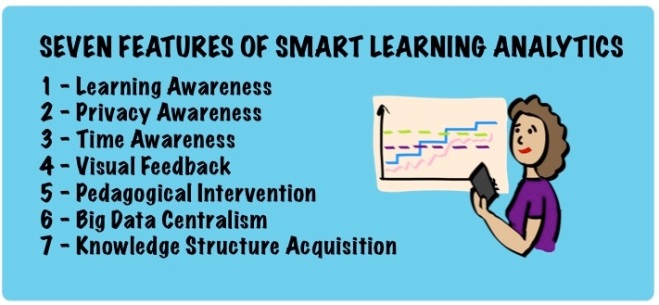Together with Behnam Taraghi, Anna Saranti and Sandra Schön we discussed and broad together what makes learning analytics smart – from our perspectives and experiences with some years of work (and several publications). Here your will find the whole publication or simply summarized as figure:
Abstract:
Learning Analytics (LA) is an emerging field; the analysis of a large amount of data helps us to gain deeper insights into the learning process. This contribution points out that pure analysis of data is not enough. Building on our own experiences from the field, seven features of smart learning analytics are described. From our point of view these features are aspects that should be considered while deploying LA.
Reference: Martin Ebner, Behnam Taraghi, Anna Saranti, Sandra Schön (2015). Seven features of smart learning analytics – lessons learned from four years of research with learning analytics. In: eLearning Papers, Issue 40, January 2015, pp. 51.55, URL: https://www.openeducationeuropa.eu/en/article/Assessment-certification-and-quality-assurance-in-open-learning_From-field_40_3?paper=164347


Danke Martin für die interessanten Gedanken zu Learning Analytics.
Zu Punkt 6 in obiger Publikation: „Big Data Centralism: An important reason what LA makes powerful is the potential notion of data centralism“ möchte ich anregen von Anfang an einen Schritt weiter zu denken. Der Konflikt zwischen Datensparsamkeit (Datenschutz) und Learning Analytics hängt ja eng mit Big Data zusammen. Ich denke wir sollten uns Big Data und Learning Analytics von Anfang an dezentralisiert vorstellen/modellieren und nicht zentralisiert. Verteilte Peer-2-Peer Protokolle wie Blockchain und Bittorrent bieten da mögliche Ansätze dazu. Anonymous Peer to Peer Big Data könnte da eine technische Lösung bieten um Learning Analytics mit Datenschutz in Einklang zu bringen.
Lieber Marc,
ja da hast du recht, das ist sicher ein spannender und gerechtfertigert Argumentationspunkt – danke 🙂